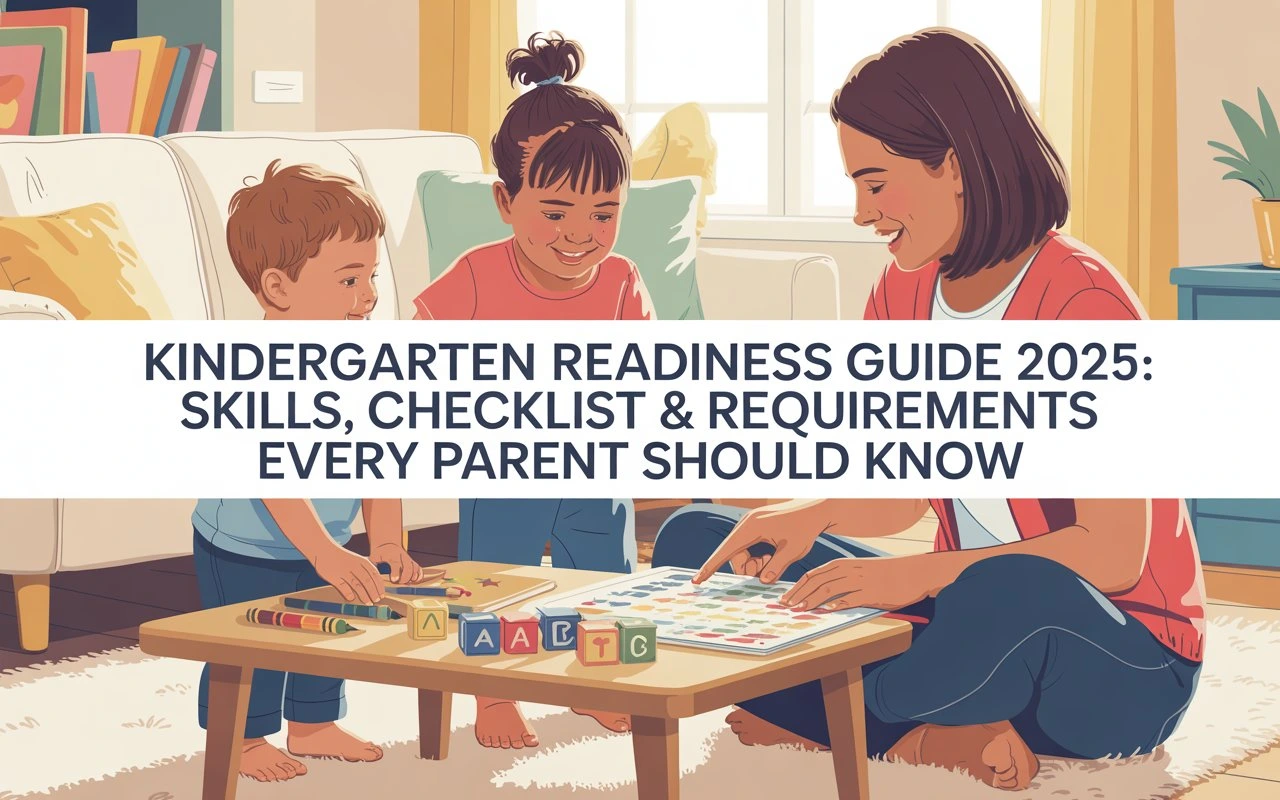Kindergarten Readiness Guide 2025: Skills, Checklist & Requirements Every Parent Should Know




Starting kindergarten is a big moment in your child’s life. It’s exciting, emotional, and a little overwhelming for parents too. One common question every parent asks is: “Is my child really ready for kindergarten?”
Kindergarten readiness is not only about ABCs or numbers. It’s about your child’s ability to communicate, manage emotions, follow routines, play with others, and take care of simple tasks independently. A good pre-kindergarten skills checklist helps parents understand where their child stands and what areas may need a little more support.
.webp)
This blog covers the kindergarten readiness checklist 2025, important skills, and the basic requirements for kindergarten, so you can confidently prepare your child for school.
Kindergarten readiness means your child has developed age-appropriate skills in six main areas:
Every child grows at a different pace. Readiness is not about perfection; it’s about showing progress, confidence, and curiosity to learn.
Below is a simple kindergarten checklist for parents that covers everyday skills your child should be working toward.
Communication is one of the most important parts of school readiness. Teachers expect children to express themselves clearly, understand instructions, and interact with classmates.
Your child is ready if they can:
How parents can support their KG Child
These skills form the foundation for learning to read in kindergarten.
Your child is ready if they can:
How parents can support
Math in kindergarten starts simple, recognizing numbers, counting, sorting, and comparing quantities.
Your child is ready if they can:
How parents can support
School involves new routines, new people, and new expectations. A child’s emotional readiness plays a huge role in their kindergarten experience.
Your child is ready if they can:
How parents can support
Kindergarten teachers encourage independence because it builds confidence.
Your child is ready if they can:
How parents can support
Both large movements (gross motor) and small hand movements (fine motor) matter for kindergarten activities.
Your child should be able to:
Your child should be able to:
How parents can support
Domain | Skills |
| Language | Clear speech, storytelling, rhyming, follows instructions |
| Literacy | Recognizes name, letters, holds book correctly |
| Math | Counting, shapes, more/less, matching items |
| Social/Emotional | Sharing, turn-taking, routines, expressing feelings |
| Self-Care | Toileting, dressing, cleaning up |
| Physical | Running, hopping, scissors, pencil grip |
This is completely normal.
Every child develops differently, and many children are stronger in some areas and weaker in others.
What matters is progress, not perfection.
Remember, readiness is a journey, not a race.
These small habits build confidence and spark a love for learning.
Choosing the right online kindergarten class is an important decision for parents. Kindergarten is the stage where children build their first learning skills, confidence, and habits. With online learning becoming more popular, many families prefer online kindergarten programs for flexibility and comfort. But with so many options available, it can be confusing to know which one is truly right for your child.
If you want a clear guide that helps you compare programs and make the best choice, read our full article here:
| How to Choose the Right Online Kindergarten Program. |
| What Is an Online Nursery Class & How Does It Work? |
| Why Preschool Education Is Important for Child Development and School Readiness |
Before children step into kindergarten, they benefit from practicing simple everyday skills that help them settle in comfortably. This isn’t about advanced learning, it’s about confidence, independence, and the ability to manage basic routines. When children can communicate, follow simple instructions, and take care of small tasks on their own, their first school experience becomes much smoother.
For a full breakdown of the skills that matter most, explore our guide:
If you want structured, expert-guided support, Interval Learning’s Online Kindergarten Program is designed to help children develop all the essential skills for school.
Our program offers:
If you’re looking for a trusted and child-friendly kindergarten program, Interval Learning helps your child build the right skills—step by step.
Enroll in Interval Learning’s Online Kindergarten Program today and prepare your child for a confident start to school. Contact us today!
It is a list of important skills—language, math, social, emotional, and physical—that shows whether a child is ready for school.
Most schools look for independence, communication skills, early literacy and math abilities, and the ability to follow routines.
Read daily, practice counting, teach simple routines, encourage play with other children, and help them become more independent.
That’s completely normal. Focus on slow, steady progress. You can also get help from structured programs like online kindergarten classes.
It includes skills like recognizing letters, counting objects, following instructions, sharing, taking turns, and basic self-care.
Interval Learning offers one-on-one online sessions that build all key readiness skills—literacy, math, social skills, thinking skills, and independence.
Yes. The classes are fully online and flexible for parents across India and abroad.
Because it combines personalized teaching, structured activities, interactive learning, and expert educators who understand young children’s needs.